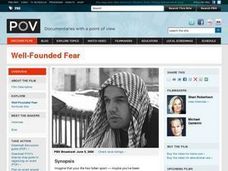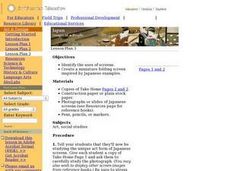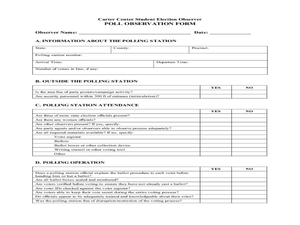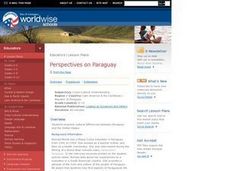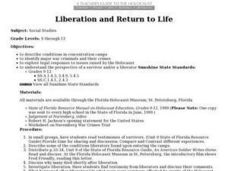Curated OER
Our Country
Second graders study about being a citizen in a democracy. They also study about the important American symbols and the process for electing the President. Students develop a creative writing story and create a drawing of a room....
Curated OER
Literature: Porgy and Bess
Students examine the various portrayals of African-Americans in literature, focusing on the opera, Porgy and Bess. They conduct Internet research on African-American culture between the two World Wars. Students write fictional or...
Curated OER
Lesson Plan for Adagio for Strings, Op. 11 (1938)
Pupils study the life and music of composer, Samuel Barber. In groups, representing trees, water, and stars they use interpretive dance to tell the story of the musical composition, 'Adagio for Strings, Op. 11' by Barber.
Curated OER
Las Vegas: We Are Just Like You
High schoolers practice making multimedia documentary films by investigating cities of America. In this U.S. geography lesson, students examine Las Vegas and compare the state of Nevada to 15 other states and discuss their main...
Curated OER
Where Are The Dinosaurs?
Students study the existence of dinosaurs as a precursor to learning about extinction. In this dinosaurs lesson, students watch dinosaur video at assigned web sites. They discuss what they observed in the videos including how the...
Curated OER
Flag Wars
Students consider how zoning policy shapes the character of neigborhoods. They see how zoning and loan policies have been used historically in the U.S. to benefit some people and discriminate against others. They examine tensions between...
Curated OER
Asylum Talk Show
High schoolers investigate the case of a German ship containing Jewish refugees seeking asylum from Nazi persecution in the late 1930s. They conduct Internet research, watch a video, and role-play passengers from the St. Louis on a...
Curated OER
The Education of Shelby Knox Lesson Plan: The History of Teaching About Sex
Students examine the current debate over sex education. They examine a variety of sex education approaches and determine which one is use in thier school district.
Curated OER
Confronting Genocide
Students discover what the term genocide means and are assigned to groups to reasearch an act of genocide in order to answer each question from their worksheet. They then compare their results making special notes of patterns they observe.
Curated OER
Celebrating Benjamin Franklin
Young scholars explore various websites featuring the life and achievements of Benjamin Franklin. They investigate Franklin's roles in colonial society as well as pictures of his various inventions. They view excerpts of historical...
Curated OER
Japan: Images of a People
Students learn the geography of Japan and its location in reference to the United States.
Curated OER
The Overthrow of the Hawaiian Monarchy
Eighth graders discover details about the overthrow of Queen Liliuokalani. In this Hawaiian history lesson, 8th graders watch "Hawaii's Last Queen," and read Hawaii's Story by Hawaii's Queen. Students reply to discussion...
Curated OER
Observing Elections Around the World
Students examine elections in countries around the world. In this elections lesson, students watch a video segment regarding election observations and then access selected websites to research specified elections. Students prepare...
Curated OER
High School Sikh Lesson Plan
Students examine post 9/11 backlash. In this hate crimes lesson, students watch "Dastaar," a documentary featuring Sikh discrimination. Students discuss their impressions of the documentary.
Curated OER
Twain: Icon and Iconoclast
Students examine work by Mark Twain in the context of pre- and post-Civil War America. In this cross curricular activity, students gather biographical information about Twain, use a Venn diagram to compare and contrast him with...
Curated OER
Miracles of the Heart
Students watch a movie. In this cultures lesson, students read A World Without Black People and then discuss segregation. Students watch the video Partners of the Heart or Something the Lord Made and then reflect on the video in their...
Curated OER
Auschwitz Episode Guide: Corruption
Students examine life at the Auschwitz concentration camp. They watch and discuss a PBS documentary, analyze reasons for prosecuting perpetrators after the war, and develop criteria for recognizing Internet sites developed by Holocaust...
Curated OER
Perspectives on Paraguay
Students locate the country of Paraguay on a world map. As a class, they brainstorm how their lives might be different from someone living in Paraguay. After reading an article, they compare the two cultures and compare it with their...
Curated OER
Brown v. Board: Where are We Now?
Students explore the concept of resegregation. In this civil rights lesson, students research the impact of the Brown v. Board of Education ruling in their community. Students define and research...
Curated OER
Liberation and Return to Life
Students read testimonies of Holocaust survivors, describe conditions liberators found upon entering camps, investigate liberation, and research background of the Office of Special Investigations and Nuremberg War Crimes Trials.
Curated OER
Lesson Plan: The Black Press
High schoolers examine the history of the black press. In this media awareness lesson, students watch videos and conduct research regarding the history of the black press in America. High schoolers explore media careers as they read...
Curated OER
Ideal Weight, Cultural Stereotypes, and Eating Disorders
Students explore the societal stigma that accompanies people who are overweight. In addition, students research current medical thinking on "ideal weight" and identify how the perception of body image can lead to eating disorders.
Curated OER
Writing a Play about Immigrant Life in America
Learners research why immigrants came to America and the processes involved in the settlement. They write a script for a short play explaining the causes for immigration and situations that immigrants found themselves in.
Curated OER
Your Place in Time Scavenger Hunt
Fifth graders divide themselves into groups of 3 or 4, research 4 different generations, and answer the questions on the handout provided. They then work in cooperative groups to create a poster illustrating their generation.








